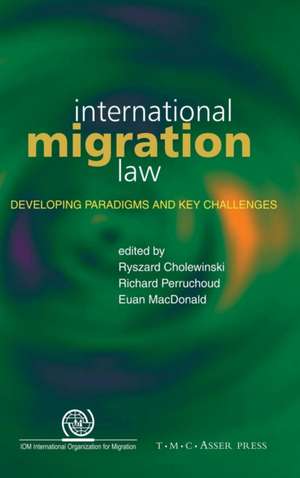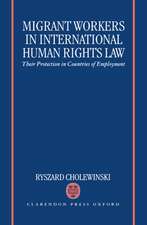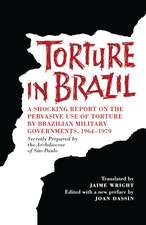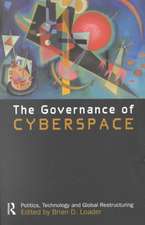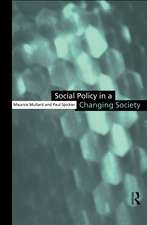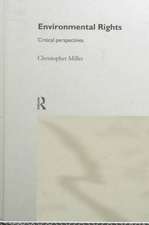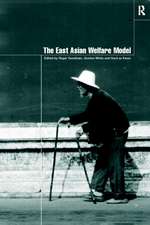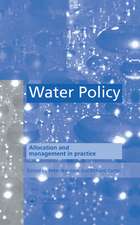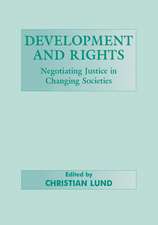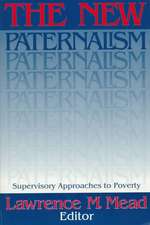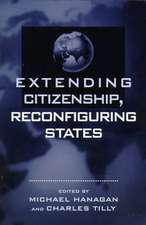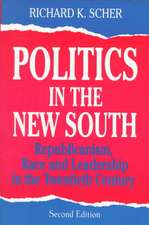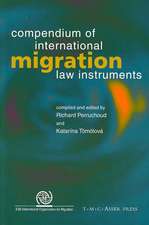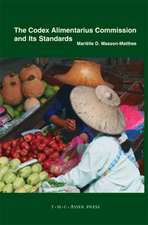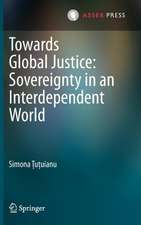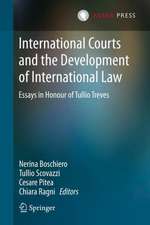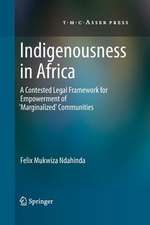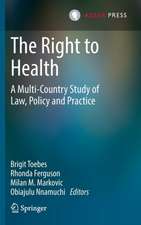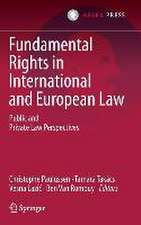International Migration Law: Developing Paradigms and Key Challenges
Editat de Ryszard Cholewinski, Euan MacDonald, Richard Perruchouden Limba Engleză Hardback – 10 mai 2007
This book encapsulates the law of international migration by examining developments first addressed in the volume on Migration and International Legal Norms (edited by T.A. Aleinikoff and V. Chetail; T.M.C. Asser Press 2003) and by discussing wholly new themes. In this regard, the book considers emerging issues, such as the challenges posed by migration to State sovereignty and the protection of human rights as a result of the increasing tensions between anti-terrorism or security legislation and immigration measures, the impact of the use of biometrics technology (e.g. fingerprinting) to identify and better monitor international movements of persons, and enhanced cooperation on the European Union external border. The human rights of vulnerable groups of migrants, such as migrant workers, women, victims of trafficking, and stateless persons are also examined.
The issue of forced migration warrants a consideration of the international migration law relating to groups such as internally displaced persons, as well as the international community’s response to secondary movements of asylum-seekers. Questions of state responsibility concerning, for example, stranded migrants and provision of consular protection and assistance to migrants are also discussed. Moreover, the expansion of regional legal frameworks concerned with migration, such as EU immigration and asylum law and policy and the growing case law on European citizenship, as well as developments in free movement regimes in Africa, the Americas and the Caribbean, are added to the analysis of the growing body of international migration law.
A range of persons from international organizations, legal practice and academia with expertise in International Migration Law have contributed to this volume, which is aimed at a broad audience, including policy makers, academics, researchers, postgraduate students, legal practitioners, civil society representatives and journalists.
Ryszard Cholewinski is Labour Migration Specialist in the Migration Policy, Research and Communications Department of IOM, the International Organization for Migration, in Geneva. In the same organization, Richard Perruchoud is Director of the International Migration Law and Legal Affairs Department. Euan MacDonald holds a PhD in public international law from the European University Institute in Florence.
| Toate formatele și edițiile | Preț | Express |
|---|---|---|
| Paperback (1) | 652.17 lei 6-8 săpt. | |
| T.M.C. Asser Press – 30 oct 2014 | 652.17 lei 6-8 săpt. | |
| Hardback (1) | 660.37 lei 3-5 săpt. | |
| T.M.C. Asser Press – 10 mai 2007 | 660.37 lei 3-5 săpt. |
Preț: 660.37 lei
Preț vechi: 776.90 lei
-15% Nou
Puncte Express: 991
Preț estimativ în valută:
126.37€ • 132.10$ • 106.79£
126.37€ • 132.10$ • 106.79£
Carte disponibilă
Livrare economică 14-28 februarie
Preluare comenzi: 021 569.72.76
Specificații
ISBN-13: 9789067042321
ISBN-10: 9067042323
Pagini: 492
Ilustrații: XLI, 492 p.
Dimensiuni: 155 x 235 x 34 mm
Greutate: 0.97 kg
Ediția:2007
Editura: T.M.C. Asser Press
Colecția T.M.C. Asser Press
Locul publicării:The Hague, Germany
ISBN-10: 9067042323
Pagini: 492
Ilustrații: XLI, 492 p.
Dimensiuni: 155 x 235 x 34 mm
Greutate: 0.97 kg
Ediția:2007
Editura: T.M.C. Asser Press
Colecția T.M.C. Asser Press
Locul publicării:The Hague, Germany
Public țintă
ResearchCuprins
State Sovereignty and Responsibility.- Anti-Terrorism Laws and the Legal Framework for International Migration.- The Legal Protection of Stranded Migrants.- Detention of Irregular Migrants and Asylum Seekers.- Consular Protection and Assistance.- Multiple Nationality: The Practice of Germany and The Netherlands.- Trade and Labour Migration.- Gats Mode 4 and the Mobility of Labour.- Global Remittances and the Law: A Review of Regional Trends and Regulatory Issues.- Migration and Free Trade Agreements: Lessons from NAFTA and Perspectives for CAFTA-DR.- Forced Migration.- Changing Paradigms in Refugee Law.- Addressing Secondary Refugee Movements.- Responding to the Challenge of Internal Forced Migration: The Guiding Principles on Internal Displacement.- Claims for Restitution and Compensation.- Human Rights of Specific Migrant Groups.- The Protection of Non-Citizens in International Human Rights Law.- Migrant Women.- The Rights of Migrant Workers.- Trafficking of Human Beings and their Human Rights in the Migration Context.- An Evaluation of International Instruments That Address the Condition of Statelessness: a Case Study of Estonia and Latvia.- Free Movement Regimes and Other Regional Developments.- Free Movement of EU Nationals and Union Citizenship.- Legislative Harmonization in European Immigration Policy.- Moving Freely on the African Continent: the Experiences of ECOWAS and SADC with Free Movement Protocols.- Free Movement Regimes in South America: The Experience of the Mercosur and the Andean Community.- Free Movement of Persons in the Caribbean Community.- Continuing and Emerging Issues of Significance.- Cooperation Mechanisms.- Biometrics and International Migration.- Enhancing Cooperation on Border Controls in the European Union.- Conclusion.- International Legal Norms on Migration: Substance without Architecture.
Textul de pe ultima copertă
With a Foreword by Brunson McKinley, Director General of the International Organization for Migration (IOM)
This book encapsulates the law of international migration by examining developments first addressed in the volume on Migration and International Legal Norms (edited by T.A. Aleinikoff and V. Chetail; T.M.C. Asser Press 2003) and by discussing wholly new themes. In this regard, the book considers emerging issues, such as the challenges posed by migration to State sovereignty and the protection of human rights as a result of the increasing tensions between anti-terrorism or security legislation and immigration measures, the impact of the use of biometrics technology (e.g. fingerprinting) to identify and better monitor international movements of persons, and enhanced cooperation on the European Union external border. The human rights of vulnerable groups of migrants, such as migrant workers, women, victims of trafficking, and stateless persons arealso examined.
The issue of forced migration warrants a consideration of the international migration law relating to groups such as internally displaced persons, as well as the international community’s response to secondary movements of asylum-seekers. Questions of state responsibility concerning, for example, stranded migrants and provision of consular protection and assistance to migrants are also discussed. Moreover, the expansion of regional legal frameworks concerned with migration, such as EU immigration and asylum law and policy and the growing case law on European citizenship, as well as developments in free movement regimes in Africa, the Americas and the Caribbean, are added to the analysis of the growing body of international migration law.
A range of persons from international organizations, legal practice and academia with expertise in International Migration Law have contributed to this volume, which is aimed at a broad audience, including policy makers, academics, researchers, postgraduate students, legal practitioners, civil society representatives and journalists.
Ryszard Cholewinski is Labour Migration Specialist in the Migration Policy, Research and Communications Department of IOM, the International Organization for Migration, in Geneva. In the same organization, Richard Perruchoud is Director of the International Migration Law and Legal Affairs Department. Euan MacDonald holds a PhD in public international law from the European University Institute in Florence.
This book encapsulates the law of international migration by examining developments first addressed in the volume on Migration and International Legal Norms (edited by T.A. Aleinikoff and V. Chetail; T.M.C. Asser Press 2003) and by discussing wholly new themes. In this regard, the book considers emerging issues, such as the challenges posed by migration to State sovereignty and the protection of human rights as a result of the increasing tensions between anti-terrorism or security legislation and immigration measures, the impact of the use of biometrics technology (e.g. fingerprinting) to identify and better monitor international movements of persons, and enhanced cooperation on the European Union external border. The human rights of vulnerable groups of migrants, such as migrant workers, women, victims of trafficking, and stateless persons arealso examined.
The issue of forced migration warrants a consideration of the international migration law relating to groups such as internally displaced persons, as well as the international community’s response to secondary movements of asylum-seekers. Questions of state responsibility concerning, for example, stranded migrants and provision of consular protection and assistance to migrants are also discussed. Moreover, the expansion of regional legal frameworks concerned with migration, such as EU immigration and asylum law and policy and the growing case law on European citizenship, as well as developments in free movement regimes in Africa, the Americas and the Caribbean, are added to the analysis of the growing body of international migration law.
A range of persons from international organizations, legal practice and academia with expertise in International Migration Law have contributed to this volume, which is aimed at a broad audience, including policy makers, academics, researchers, postgraduate students, legal practitioners, civil society representatives and journalists.
Ryszard Cholewinski is Labour Migration Specialist in the Migration Policy, Research and Communications Department of IOM, the International Organization for Migration, in Geneva. In the same organization, Richard Perruchoud is Director of the International Migration Law and Legal Affairs Department. Euan MacDonald holds a PhD in public international law from the European University Institute in Florence.
